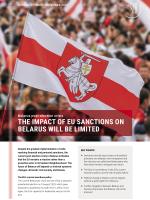The impact of EU sanctions on Belarus will be limited

The EU’s current sanctions policy
The current Belarusian crisis was set off by a disputed presidential election on 9 August 2020, which gave Alexander Lukashenko his sixth term in office. Once again, the EU’s capacity for leadership was put to the test.
- Sanctions should stay in place until political prisoners are released, new transparent and fair elections are called and Belarusians who have been forced to emigrate can return.
- The lack of consistency in the EU’s current sanctions policy runs the risk of policy failure.
- Political change in Belarus cannot happen without a green light from Moscow.
- Further integration between Belarus and Russia will proceed, but Belarus will not be annexed.
When faced with the escalating post-election crisis in Belarus, the EU acted relatively fast, and after attempts to establish a dialogue failed, first sanctions followed in October 2020. The sanctions policy sent a signal to the Belarusian regime that EU member states can reach a common agreement. However, according to regional experts, the sanctions should have been broader and implemented earlier to show support for Belarusian society.
Tougher sanctions were introduced when a Ryanair flight was forced to land in Minsk in May 2021. The extended sanctions package that followed increased the targeting of financial assets and state companies that are important contributors to the Belarusian state’s budget. Broader personal and sectoral sanctions hit Belarusian national industry and Alexander Lukashenko’s immediate political circles. In response, he has engineered a migration crisis on the EU’s external border in Poland, Lithuania and Latvia that is destabilising the security situation in the region.
The effectiveness of the new sanctions remains limited, as even those high state officials who have been targeted generally do not travel extensively or hold assets abroad. Moreover, while some of the sectoral sanctions are particularly aggravating to, for example, Belarusian transportation and logistics sectors (e.g., banning air carriers such as Belavia), they have sometimes targeted companies that do not have very strong trading links with the West, but that cooperate extensively with Russia (e.g., the production of machines for exports to the east).
There are also numerous loopholes in the sanction’s regime (e.g., exceptions made for imports of potash fertilizers) that undermine its effectiveness and have been blamed on certain lobby groups in Europe connected to businesses that trade with the Belarusian regime. Furthermore, loopholes seem to have been left in place intentionally to leave room for future dialogue with Belarus.
In the long term, sanctions could shorten the lifespan of the regime by eroding the structure of the Belarusian elite and partially undercutting the resources that underpin the post-Soviet institutions on which it relies.
How to improve sanctions?
Experts on the region agree that sanctions must be consistent. Continuous pressure is necessary, and the Belarusian regime should be isolated. The lack of a consistent approach to sanctions runs the risk of repeating the failures of past EU sanctions policies. For instance, previous sanctions against Belarus introduced in 2006, and then again in 2010 after the elections, were used in a transactional manner, e.g., to bargain for the release of political prisoners by Lukashenko.
These sanctions were largely lifted after the outbreak of the wars in Georgia in 2008 and Ukraine in 2014 due to the EU’s concerns about Russian influence growing in Belarus if sanctions stay in place. That has undermined them as an effective policy tool and was interpreted in the region as a weakness that could potentially inspire further aggression.
Sanctions should be broadened and better targeted at the Belarusian political establishment closest to Alexander Lukashenko. First, personal sanctions could include the entire families of targeted individuals. Second, they could embrace lower administrative levels responsible for, e.g., general elections (such as local electoral committees). Third, the international coalition of actors that is imposing sanctions could be extended to other states (e.g., members of the Eastern Partnership) and to international institutions that continue to provide aid to Belarus (e.g., the IMF World Bank).
Four packages of sanctions have been implemented so far targeted towards Alexander Lukashenko’s business environment and the public sector.
The first three packages included personal sanctions (e.g. travel bans) against 74 people (e.g., prosecutors, judges, security officials).
The fourth package affected many key companies, such as e.g., BelAZ (Belarusian Automobile Plant), Belaruskali (potash fertilizers company), tobacco and oil sectors, as well as arms trade and communication technology.
It also restricted access to European Union capital markets for the Belarusian Government and state-owned financial institutions and strongly affected the Belarusian banking sector, making it harder for the local banks to swiftly run transactions in EUR and USD (also US sanctions), and negatively affecting Belarusian investors, exporters, and companies. The fourth package also extended personal sanctions to a greater number of people.
The fifth package of sanctions is being prepared in response to a growing migration crisis at the Polish-Belarusian border.
The real impact of the current sanctions will be delayed because they are based on the EU’s legal culture, whereby contracts signed before their implementation are not included. When old contracts expire and new ones are not signed in December 2021 to January 2022, it will be easier to evaluate to what extent the sanctions policy is likely to lead to ‘cracks’ in the structures of the Belarusian elite. Independent economists estimate that the current sanctions regime may cause Belarusian GDP to depreciate by 10% or more. For this reason, sanctions should also be communicated better to those social actors in Belarus who question their lack of effectiveness just a few months after their implementation.
Sanctions should stay in place until several key conditions are met: first, the release of all political prisoners by Alexander Lukashenko; second, starting a real conversation about the political transformation in Belarus and the organization of free and fair presidential elections with external observers such as the OSCE; third, the return to Belarus of those who have been forced to emigrate; and fourth, an investigation into cases of torture against protesters committed by the Belarusian authorities.
In the long term, sanctions could shorten the lifespan of the regime by eroding the structure of the Belarusian elite and partially undercutting the resources that underpin the post-Soviet institutions on which it relies.
On the downside, the EU’s sanctions policy might further isolate Belarus on the international scene, increase Russian influence in Belarus and adversely affect ordinary workers. Yet, their absence would strengthen the oppressive regime, which has increasingly depended on Russia regardless of relations with the West. While sanctions accelerate this process, they cannot cause a political transformation in Belarus, merely acting as an additional source of pressure.
Future scenarios for Belarus
The EU needs a long-term strategy for dealing with Belarus that would include consistent sanctions that do not allow for many exceptions while keeping open certain channels of communication with the Belarusian regime. A real dialogue with Belarus is hard to establish. First, the ongoing migration crisis and the domestic repression, including instances of torture, in Belarus are unprecedented and make coming back to ‘business as usual’ virtually impossible.
Second, the mismatched expectations on the Belarusian and EU sides, with the former seeking acceptance of the outcome of the past election and the latter calling for new free elections, further hamper the potential for dialogue. Engaging in dialogue with Alexander Lukashenko would inevitably partially legitimize his power and provide him with additional space for political manoeuvring, as well as the financial means to prolong his regime’s survival. However, limited discussions are needed on issues such as the release of political prisoners and should be seen rather as a precondition to starting any conversation.
Russia will retain a pivotal role in deciding the political fate of Belarus, and without a green light from Moscow, real long-term changes in the country are hardly conceivable.
With respect to establishing talks, a negotiation task force led by the OSCE or having, for example, a UN mandate should be established consisting of countries that have not been directly affected by the current migration crisis on the Belarusian-EU borders (Poland, Lithuania, and Latvia), as they would not be considered neutral negotiating partners by the Belarusian side. The EU should also consider evoking institutional measures, such as establishing a special unit on Belarus within its structures that could prepare future crisis-management plans (e.g., a long-term transitional program for the Belarusian economy).
While humanitarian aid for the Belarusian diaspora should be in place for a limited period of adaptation, it is crucial to ensure that financial support is directed primarily to and reaches Belarusian civil society within the country, rather than international organizations. Current aid and educational programs in the region should also be better structured and coordinated to improve their effectiveness.
Russia will retain a pivotal role in deciding the political fate of Belarus, and without a green light from Moscow, real long-term changes in the country are hardly conceivable. Russia is using the present situation to expand its influence in Belarus by actively supporting Lukashenko’s regime and strengthening the pressure for integration between the two countries. Russia is still perceived in a positive light by Belarusians, who are nonetheless opposed to the absorption of Belarus into Russia, while largely favouring deeper integration with it.
A gradual loss of Belarusian independence is continuing to take place through further integration between the two states, especially since Alexander Lukashenko signed 28 ‘road maps’ with Russia in the economic, energy and military sectors on 4 November 2021. In the long-term Russia might want to secure its interests in Belarus either in a more institutionalized way (e.g., an increased role for the Belarusian Parliament and the establishment of a pro-Russian political party) or by supporting another candidate from within the system. Currently, opposition candidates from outside the Belarusian system have no chances of succeeding in elections, even though they are a viable option to the people. The domestic political establishment, however, would not accept them, fearing repercussions and a loss of influence.
The risks of personal repercussions for protesters in Belarus are currently extremely high and are successfully preventing further protests. However, the sustained democratic transformation in Belarus could ultimately only be brought about by its people and the gradual dismantling of the economic, political and ideological structures that underpin its post-Soviet institutions.
DIIS Experts



